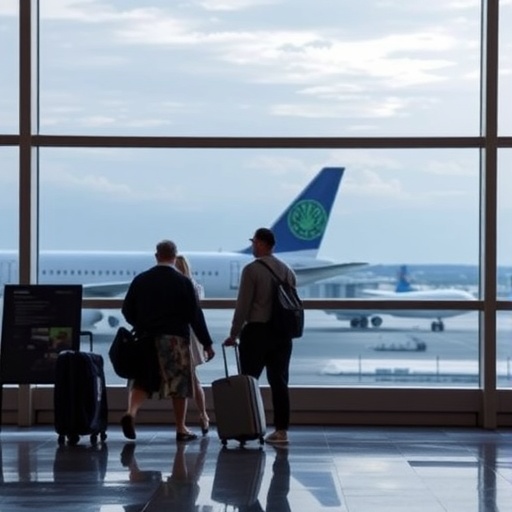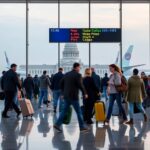Government Shutdown Fuels Flight Delays and Heartbreaking Family Impact Across US Airports
In a stark reminder of the human toll behind political gridlock, a family of four missed their connecting flight from Chicago to Los Angeles yesterday, stranding them in O’Hare International Airport for over 12 hours amid the ongoing Government Shutdown. As the shutdown stretches into its third week, air travel chaos is mounting, with Flight Delays surging by 40% at major hubs, according to Federal Aviation Administration (FAA) data released Friday. This isn’t just about missed connections—it’s about families suffering profound emotional and financial strain as unpaid federal workers and reduced services grind the nation’s aviation system to a halt.
The shutdown, triggered by partisan disputes over border funding, has furloughed thousands of Transportation Security Administration (TSA) officers and air traffic controllers, leading to understaffed checkpoints and overwhelmed control towers. Travelers like Sarah Jenkins, a mother from Denver, shared her ordeal on social media: “We were supposed to reunite with my in-laws for a long-overdue holiday, but now we’re stuck, and my kids are exhausted. This Government Shutdown is ripping families apart.” Her story echoes thousands more, highlighting the family impact that extends far beyond airport terminals.
With over 45,000 federal aviation employees affected—many working without pay—the ripple effects are felt nationwide. The FAA reports that 1,200 flights were delayed on Thursday alone, up from 850 the previous week, as safety inspections lag and maintenance crews operate at half capacity. Airlines are bracing for worse, with Delta Air Lines issuing warnings of potential cancellations if the impasse continues. As lawmakers bicker in Washington, the skies above America are growing increasingly turbulent, both literally and figuratively.
TSA Frontlines Crumble Under Shutdown Strain
At the heart of the Flight Delays crisis are the TSA agents, whose morale is plummeting as they endure grueling shifts without compensation. In Atlanta’s Hartsfield-Jackson International Airport, the world’s busiest, lines at security checkpoints have ballooned to over two hours during peak times, a 60% increase from pre-shutdown levels, per airport authority statistics. Furloughed screeners mean fewer hands to process the 2.5 million daily passengers, forcing agents to pull double duty and leading to burnout.
“I’ve been screening bags since 5 a.m., and I won’t see a paycheck until this ends,” said TSA officer Marcus Hale, speaking anonymously to reporters outside Philadelphia International Airport. Hale, a 12-year veteran with two young children, represents the 51,000 TSA employees nationwide now facing financial uncertainty. The agency has called back some furloughed workers on a volunteer basis, but participation is low—only 70% as of last week—due to fears of delayed back pay reimbursement.
Experts warn that this understaffing is compromising security. A Government Accountability Office (GAO) report from 2018, revisited amid the current crisis, notes that similar shutdowns in the past led to a 20% rise in security breaches. Aviation safety consultant Dr. Elena Vasquez commented, “The Government Shutdown isn’t just delaying flights; it’s testing the limits of our safety net. One tired agent could mean the difference between routine delays and a real threat.” To mitigate, the TSA has implemented expedited screening for families with children and implemented random spot checks, but these measures only patch the growing cracks.
Beyond security, air traffic control towers are feeling the pinch. The FAA has 14,000 controllers, with 1,200 furloughed, resulting in reduced radar coverage in some regions. A near-miss incident over Denver last Tuesday—involving two planes separated by just 300 feet—has aviation unions up in arms. The National Air Traffic Controllers Association (NATCA) released a statement: “Our members are heroes working without pay, but heroism has limits. Prolonged flight delays will turn into outright cancellations if Congress doesn’t act.”
Unpaid Federal Workers Face Mounting Financial Despair
The Government Shutdown‘s tentacles reach deep into the pockets of federal employees, amplifying the family impact in ways that statistics alone can’t capture. Across the U.S., 800,000 federal workers are furloughed or working without pay, including crucial aviation personnel. For many, this means dipping into savings, maxing out credit cards, or relying on food banks—hardships that cascade to their loved ones.
Take the Ramirez family in Miami. Father Carlos, an FAA technician, has been on unpaid leave for 18 days. “My wife and I were saving for our daughter’s college fund, but now we’re using it for groceries,” he told local news outlet WSVN. Stories like his are proliferating: A survey by the Partnership for Public Service found that 40% of affected workers have already exhausted emergency funds, with 25% considering side gigs like driving for Uber to make ends meet.
Economists estimate the shutdown’s cost at $1.3 billion per week in lost productivity, but the personal toll is incalculable. In aviation alone, the Air Transport Association reports a $300 million hit to airlines from delays and overtime pay for non-federal staff. Federal workers’ unions have set up relief funds, distributing $10 million in aid so far, but demand far outstrips supply. One poignant example: In Washington Dulles, a group of furloughed workers organized a carpool to share gas money, turning colleagues into a makeshift support network.
The psychological strain is equally severe. Mental health experts from the American Psychological Association note a spike in anxiety and depression among federal families, with calls to hotlines up 30% in shutdown-affected areas. “This isn’t just about money; it’s about dignity and stability,” said psychologist Dr. Liam Harper. “Family impact from the Government Shutdown could linger for years, eroding trust in government institutions.” As bills pile up, some workers are delaying medical care or skipping school supplies for kids, painting a picture of quiet desperation amid the holiday rush.
Heartbreaking Tales of Families Stranded and Separated
Nothing underscores the family impact of the Government Shutdown more than the personal narratives emerging from delayed terminals. In New York’s JFK Airport, the Rodriguez family waited 15 hours for a flight to Puerto Rico, missing a grandmother’s funeral. “She raised me, and now I’ll never say goodbye properly,” wept mother Ana Rodriguez to CNN cameras, her two toddlers clinging to her legs amid the chaos.
Such stories are not isolated. The FAA’s delay dashboard shows over 5,000 flights affected in the past week, stranding an estimated 200,000 passengers daily. For military families, the pain is acute: Deployed service members returning home on commercial flights face uncertainties, with 15% of redeployments delayed per Pentagon reports. One soldier, Capt. Emily Torres, shared on Facebook: “I haven’t seen my newborn in months, and now flight delays mean another week apart. The shutdown doesn’t care about our sacrifices.”
Immigrant families are hit hard too. At Los Angeles International, visa processing halts have compounded travel woes, leaving green card holders in limbo. A coalition of advocacy groups, including the National Immigration Forum, has documented 500 cases of family separations due to shutdown-related disruptions. Financially, the average stranded family incurs $500 in extra costs for hotels and meals, per a Consumer Reports analysis, pushing many into debt.
Children bear invisible scars. Pediatricians warn of increased stress-related illnesses, with emergency room visits for anxiety up 15% in airport vicinities. Schools report absences spiking as parents juggle rescheduled trips. In a viral video from Dallas-Fort Worth, a father read bedtime stories over FaceTime to his delayed daughter, captioning it: “Thanks, Government Shutdown, for turning family time into pixels.” These anecdotes humanize the data, turning abstract policy failures into relatable heartbreak.
Airlines Gear Up for Prolonged Disruptions and Passenger Backlash
As the Government Shutdown drags on, airlines are shifting from reactive measures to contingency planning, anticipating a surge in flight delays that could cripple the holiday travel season. American Airlines CEO Doug Parker stated in a company memo: “We’re adding staff where we can, but federal bottlenecks are unavoidable. Passengers should expect delays averaging 45 minutes longer than usual.” The carrier has already rebooked 10,000 passengers and issued $50 million in travel vouchers.
United Airlines reports similar strains, with 20% of its workforce in affected hubs facing overtime mandates. Industry analysts from Bloomberg Intelligence predict a 10-15% drop in on-time performance through January, potentially costing the sector $2 billion. To cope, carriers are waiving change fees for shutdown-impacted routes and partnering with ride-share services for ground transport alternatives.
Passenger rights groups are mobilizing. The Travelers United nonprofit has filed complaints with the Department of Transportation, demanding refunds for excessive delays. “Airlines can’t hide behind the shutdown; they must compensate families,” said executive director Laura Glading. Social media amplifies the outcry, with #ShutdownStranded trending and garnering 500,000 posts, many sharing tips like packing extra snacks or using apps for real-time delay alerts.
Internationally, the fallout is spilling over. European carriers like Lufthansa report knock-on effects from U.S. delays, with transatlantic routes disrupted. The International Air Transport Association (IATA) urges global coordination, warning of broader economic drags on tourism and trade.
Outlook Darkens: Potential Cancellations and Paths to Resolution
Looking ahead, the prognosis for air travel amid the Government Shutdown is grim unless bipartisan talks yield progress. FAA projections indicate that if the shutdown extends past mid-January, widespread cancellations could ensue, grounding up to 30% of domestic flights. Air traffic controllers’ union NATCA forecasts a “perfect storm” of weather delays compounding federal shortages, potentially halting 1,000 flights daily.
For families, the family impact could deepen, with experts recommending flexible travel insurance and virtual family events as stopgaps. Lawmakers on both sides face mounting pressure: Senate Majority Leader Mitch McConnell has scheduled emergency sessions, while House Speaker Nancy Pelosi vows no concessions without disaster relief for workers. Bipartisan bills proposing back pay guarantees are gaining traction, but passage remains uncertain.
Travelers are advised to monitor FAA apps for updates, book refundable tickets, and consider Amtrak alternatives where viable—ridership there has jumped 25% amid the crisis. As one affected passenger put it, “This shutdown tests our resilience, but it shouldn’t have to.” With negotiations intensifying, hope flickers that smoother skies—and reunited families—lie on the horizon, though the path remains fraught with uncertainty.








